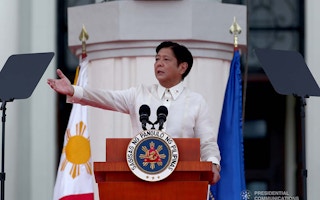Ferdinand “Bongbong” Marcos Jr., the son of an ousted Philippine dictator, said on Thursday he would be prioritising climate change issues in his administration.
Marcos Jr. was sworn in as the country’s 17th president at the National Museum in Manila, 36 years after his late father was booted out of office by a mass uprising.
In his inaugural speech after a stunning election victory that opponents say was pulled off by whitewashing his family’s image, Marcos Jr. said that he would seek help from partner nations to address the effects of climate disasters in the country.
“The rich world talks a great deal but does a lot less about it than those with much less but who suffer more death and destruction from climate change and lack of adaptation. We will look to our partners and friends to help the Philippines, which despite having a very small carbon footprint is at the highest risk,” he told a crowd of 30,000 attendees.
The first action would be to “spare victims and help them recover, and move on to lessen the harmful impact of climate change,” he added.
“
The rich world talks a great deal but does a lot less about it than those with much less but who suffer more death and destruction from climate change and lack of adaptation.
Ferdinand “Bongbong” Marcos Jr., president, Philippines
Instead of putting all the blame on big emitters, he acknowledged how the country also has a “part to play” in contributing to the world’s plastic waste problem.
“We are the third biggest plastics polluter in the world, but we won’t shirk from that responsibility. We will clean up,” he said.
Four years ago, Marcos Jr’s predecessor Rodrigo Duterte shipped back containers full of trash to Canada after a long-running row over waste exports. A Philippine court in 2016 declared the import of 2,400 tonnes of Canadian waste illegal. It had been mislabeled as plastics for recycling.
In the same year, the Philippines returned to South Korea 6,500 tonnes of mixed waste which was misdeclared as plastic flakes and did not have proper importation permits.
Amid Marcos Jr’s statements during his speech, he was found to be the “least green candidate” in pre-election research studies for supporting the negative legacies of his father’s dictatorship. These included the Kaliwa Dam project, which poses a threat to the ancestral lands of indigenous peoples in Quezon province, and the Marcopper Mining Corporation, which was responsible for one of the biggest environmental disasters in Philippine history. A massive waste spill from the Marcopper mine killed marine life and displaced nearby residents in Boac River, Marinduque.
During his campaign, Marcos Jr. said that he would back renewable energy if elected, but he also openly considered revisiting the shelved Bataan Nuclear Power Plant (BNPP), which was built during the presidency of his father.
He also used social media to call for collective action on climate change, as well proclamations to protect the environment to safeguard the most vulnerable from calamities, but it came with scant detail and an unclear platform.
Gerry Arances, executive director of research institute Center for Energy, Ecology, and Development (CEED), earlier said that throughout the campaign period, Marcos Jr. gave no more than “motherhood statements” on climate action and the energy transition.
Arances said: “This is alarming because the climate crisis and the pitiable plight of power consumers require concrete plans and decisive action to transform energy and all carbon-intensive sectors.”

















